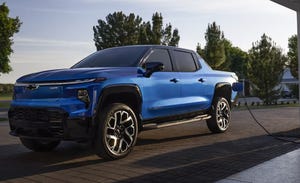
GM Says Bidirectional Charging Will Come Standard Across Its EV Lineup - CNET
GM Says Bidirectional Charging Will Come Standard Across Its EV Lineup
Vehicle-to-home, or V2H, technology allows a parked EV to power your house during a power outage.
The 2024 Chevrolet Silverado EV RST will be the first EV from GM to come with V2H technology.
GM
General Motors will make bidirectional charging standard across its Ultium-based EVs by model year 2026.
The company said Tuesday that it’ll make the technology, which allows owners to use their EVs as a backup power source, a default feature starting with the 2024 Chevrolet Silverado EV RST. The rollout will continue with the 2024 GMC Sierra EV Denali Edition 1, 2024 Chevrolet Blazer EV, 2024 Chevrolet Equinox EV and the 2024 Cadillac Lyriq.
Read on: Best Electric Vehicles
Vehicle-to-home, or V2H, charging capability will also be included in Cadillac’s first full-size all-electric SUV, the 2025 Escalade IQ, which was unveiled Wednesday.
Making bidirectionality a built-in feature “will help accelerate GM’s vision of an all-electric future by further expanding access to even more benefits that EVs can offer,” GM Energy Vice President Wade Sheffer said in a statement.
The largest automaker in the US, GM has vowed to phase out vehicles with internal combustion engines and manufacture only EVs by 2035.
Ultium batteries started appearing in GM EVs in 2021. Next year, when the Chevrolet Bolt is relaunched, Ultium will be the standard throughout the company’s various lines.
GM launched its residential charging platform, Ultium Home, last year. In June, it introduced a variety of energy management solutions designed to let homeowners use a parked EV as a backup power source during an outage or to save money during peak usage times when electricity prices are higher.
The company is currently partnering with California-based utility Pacific Gas and Electric on a pilot program exploring the ability of EVs to store energy and give it back to the electrical grid, known as vehicle-to-grid, or V2G, charging.
As utilities increasingly turn to renewables like solar and wind, the role of V2G charging is seen as critical to providing reliable and inexpensive energy storage solutions.
Several EVs already offer bidirectional charging, including the F-150 Lightning and the Nissan Leaf. In March, Tesla confirmed that all its EVs will support bidirectional charging functionality by 2025.

